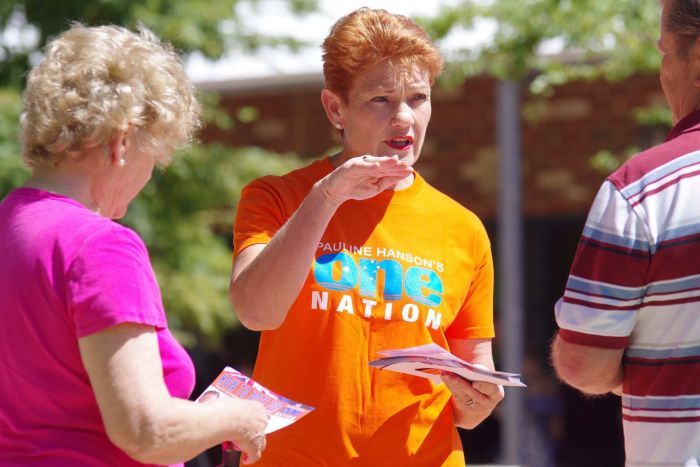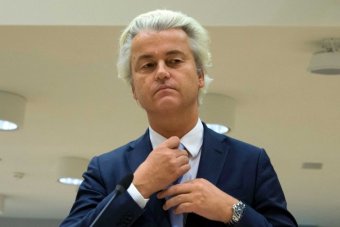Has this week marked the beginning of the end for the populists?
Posted
So, Geert Wilders did not shake up Dutch politics.
What happened to the Pauline Hanson juggernaut that was meant to sweep Western Australia?
Two elections, a world apart in the same week, has some delivering the last rites to the wave of populism that has dominated global politics.
Mr Wilders's Freedom Party won 20 seats in the 150-seat Dutch Parliament, well short of the projected 30 plus seats.
Senator Hanson was tracking at a high of 13 per cent support ahead of the WA poll, but that tailed off to fewer than 5 per cent when the votes were cast.
To some analysts, voters have had a glimpse of the post-Trump, post-Brexit world and do not like what they see.
Casting a protest vote may feel good, but the result can be a world of uncertainty.
But, not so fast. Mr Wilders said he was not going anywhere. The Freedom Party has the second highest number of seats in Parliament.
And his nativist, anti-Islam, anti-European Union platform has shifted the debate. Other right-wing parties have picked up votes adopting some of Mr Wilders's issues.
In Mr Wilders's words: "The genie cannot be put back in the bottle; people feel misrepresented."
Eyes now turn to next month's French election.
Marine Le Pen's National Front could win the presidential poll. It is unlikely, but she is expected to at least reach the second round of voting.
High unemployment, a sluggish economy, and a recent history of terrorism has helped boost support for Ms Le Pen. She champions many of the same issues as Mr Wilders, but her popularity is considered more durable.
Seeds of populism were sown long ago
 Photo:
Marine Le Pen is unlikely to win but she is expected to make it to the second round. (Reuters: Sebastien Bozon)
Photo:
Marine Le Pen is unlikely to win but she is expected to make it to the second round. (Reuters: Sebastien Bozon)
There is a temptation to view this resurgent populism as a recent phenomenon, but in fact the seeds have been long sown.
International affairs expert Cas Mudde said populism was an ideology that separated the "pure people" from the "corrupt elite".
Writing in the December 2016 issue of the journal Foreign Affairs, he said the current movement had its roots in the post-industrial revolution that radically altered Europe in the 1960s.
He said deindustrialisation and a decline in religious observance weakened the support of parties of the centre-right and centre-left.
European parties, he said, converged on a new "elite consensus" based around neo-liberal economic reform, multi-ethnic societies, and an integrated Europe.
We are witnessing the blowback by people who feel disconnected from the political class.
Populists are stronger now than at any time since the end of World War Two. In European elections over the past five years, populist parties have won at least 10 per cent of the vote in 16 countries.
Mr Mudde said 2015 was a critical year, marked by terrorism, the Greek economic crisis and an influx of refugees from war-torn regions. It fed anxiety and fear — fertile ground for populists.
Globalisation has left people marooned and isolated
Journalist and political scientist Fareed Zakaria said critical to the rise of populism was economic stasis.
Slower growth and globalisation has left people marooned and isolated.
Also writing in foreign affairs, Zakaria said culture and values were critical. There is an older generation, he said, who are traumatised by what they see as an assault on the civilisation they have been raised in.
Zakaria nominated immigration as the flashpoint. He said we were witnessing the globalisation of people and it was prompting an emotional reaction.
It reinforced the sense of loss from deindustrialisation and the information revolution. They have lost their jobs and now they feel they are losing their countries.
Leaders like Hungary's Viktor Orban have tapped into this feeling to strengthen their hold on power. He contrasted his tough borders stance with German Chancellor Angela Merkel's willkommenskultur — a culture of welcoming.
Mr Wilders may have lost personal support, but the trends and underlying issues are not going away anytime soon.
So, what exactly is populism?
Writing about populism cannot capture its appeal; it is visceral.
John B Judis in his recent book, The Populist Explosion, said it could not be defined by any common ideology. It cuts across left and right.
Judis cited historian Michael Kazin who once wrote that populism was "a language whose speakers conceive of ordinary people as a noble assemblage not bounded narrowly by class; view their elite opponents as self-serving and undemocratic; and seek to mobilise the former against the latter".
Many people speak that language — the language of Mr Wilders, Ms Le Pen, Senator Hanson. Their voices are demanding to be heard and they are shifting the agenda.
The challenge for so-called mainstream political leaders is how to speak back.
 Photo:
One Nation leader Pauline Hanson handing out how-to-vote cards in Baldivis on WA election day. (ABC News: Andrew O'Connor)
Photo:
One Nation leader Pauline Hanson handing out how-to-vote cards in Baldivis on WA election day. (ABC News: Andrew O'Connor)
Topics: world-politics, political-parties, government-and-politics, elections, australia, netherlands, france










